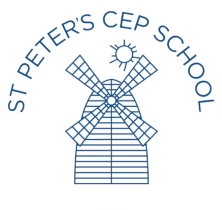Early Reading
INTENT
At St Peter’s Primary School, we are passionate about ensuring all children become confident and enthusiastic readers and writers. We believe that phonics provides the foundations of learning to make the development into fluent reading and writing easier.
Through the Little Wandle approach to teaching Reading and Phonics, we ensure that children
- apply phonic knowledge and skills as the route to decode words
- respond speedily with the correct sound to graphemes (letters or groups of letters) for all 40+ phonemes, including, where applicable, alternative sounds for graphemes
- read accurately by blending sounds in unfamiliar words containing GPCs that have been taught
IMPLEMENTATION
We follow the Little Wandle approach to teaching Reading and Phonics. Our approach is systematic, consistent and rigorous in order for all children to become readers as quickly as possible. We use the same phonics programme across the school providing continuity and a tool for guaranteed progression.
Daily phonics lessons in Reception and Year 1
We teach phonics for 30 minutes a day. In Reception, we build from 10-minute lessons, with additional daily oral blending games, to the full-length lesson as quickly as possible. Each Friday, we review the week’s teaching to help children become fluent readers.
The teaching of phonics begins in Reception in Week 2 of the Autumn term.
- Children in Reception are taught to read and spell words using Phase 2 and 3 GPCs, and words with adjacent consonants (Phase 4) with fluency and accuracy.
- Children in Year 1 review Phase 3 and 4 and are taught to read and spell words using Phase 5 GPCs with fluency and accuracy.
Daily Keep-up lessons ensure every child learns to read
- Any child who needs additional practice has daily Keep-up support, taught by a fully trained adult. Keep-up lessons match the structure of class teaching, and use the same procedures, resources and mantras, but in smaller steps with more repetition, so that every child secures their learning.
- We timetable daily phonics lessons for any child in Year 2 or 3 who is not fully fluent at reading or has not passed the Phonics screening check. We use the Little Wandle Letters and Sounds Revised assessments to identify the gaps in their phonic knowledge and teach to these using the Keep-up resources – at pace.
- If any child in Year 3 to 6 has gaps in their phonic knowledge when reading or writing, we plan phonics ‘catch-up’ lessons to address specific reading/writing gaps.
Teaching early reading: Reading practice sessions three times a week
- We teach children to read through reading practice sessions three times a week. These:
- are taught by a fully trained adult to small groups of approximately six children
- use books matched to the children’s secure phonic knowledge using the Little Wandle Letters and Sounds Revised assessments
- are monitored by the class teacher, who rotates and works with each group on a regular basis.
- Each reading practice session has a clear focus, so that the demands of the session do not overload the children’s working memory. The reading practice sessions have been designed to focus on three key reading skills:
-
- Decoding
- prosody: teaching children to read with understanding and expression
- comprehension: teaching children to understand the text
- In Reception these sessions start in Week 4. Children who are not yet decoding have daily additional blending practice in small groups, so that they quickly learn to blend and can begin to read books.
- In Years 2 to 6, we continue to teach reading in this way for any children who still need to practise reading with decodable books.
Home reading
- The decodable reading practice book is taken home to ensure success is shared with the family.
- Reading for pleasure books also go home for parents to share and read to children.
- We use the Little Wandle Letters and Sounds Revised parents’ resources to engage our families and share information about phonics, the benefits of sharing books, how children learn to blend and other aspects of our provision, both online and through workshops.
Additional reading support for vulnerable children
Children in Reception and Year 1 who are receiving additional phonics Keep-up sessions read their reading practice book to an adult daily.
Ensuring consistency and pace of progress
- Every teacher in our school has been trained to teach reading, so we have the same expectations of progress. We all use the same language, routines and resources to teach children to read so that we lower children’s cognitive load.
- Weekly content grids map each element of new learning to each day, week and term for the duration of the programme.
- Lesson templates, Prompt cards and How to videos ensure teachers all have a consistent approach and structure for each lesson.
- The English Lead and SLT regularly monitor and observe teaching; they use the summative data to identify children who need additional support and gaps in learning.
IMPACT
It is our aim that the children to become fluent readers by the end of Key Stage 1. This will ensure that they leave St Peter’s Primary School as competent readers. To ensure this will happen, we assess Phonics progress through Little Wandle assessments and past Phonics Screening Checks. If required, Placement Assessments are made for children who need to plug gaps in their Phonics knowledge.
